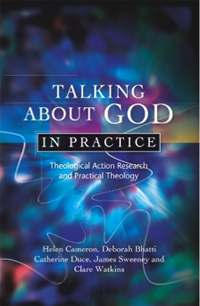
DARREN CRONSHAW reviewsTalking about God in Practice: Theological Action Research and Practical Theology...
Helen Cameron, Deborah Bhatti, Catherine Duce, James Sweeney and Clare Watkins
Talking about God in Practice: Theological Action Research and Practical Theology
SCM , London, 2010.
ISBN-13: 9780334043638
 |
“Written collaboratively by the ecumenical and interdisciplinary Action Research Church and Society (ARCS) project team, they want to show the relevance of Christian tradition to experience and help people talk about God in practice, in a culture which has moved God-talk to the margins.” |
In my church tribe, the Baptist Union of Victoria, we are planning research into congregational transformation, multicultural ministry and missional leadership development. These are identified pressing needs. There is literature we can draw on and case studies we can investigate.
Qualitative research methods promise to help us go deep in our analysis. But we are eager to work with (rather than just for) our churches and stakeholders, learn from other denominations and organisations, include postgraduate research students and emerging scholars, and ensure our research leads to real and lasting change rather than just a report and maybe a publication. Talking about God in Practice and its Theological Action Research (TAR) offers a process and model that are ready to adapt for the practitioners and budding researchers among us.
Written collaboratively by the ecumenical and interdisciplinary Action Research Church and Society (ARCS) project team, they want to show the relevance of Christian tradition to experience and help people talk about God in practice, in a culture which has moved God-talk to the margins. The two major frameworks they draw on are practical theology and its interest in bridging experience and tradition with theological reflection and interdisciplinary studies; and action research that addresses real-life problems with researchers working collaboratively with participants to develop new action plans.
The fresh methodology of TAR is a collaborative and conversational approach for helping churches and agencies sharpen and fulfill their mission. In definition: “Theological Action Research is a partnership between a insider and an outsider team to undertake research and conversations answering theological questions about faithful practice in order to renew both theology and practice in the service of God’s mission.”
It is a partnership between an “insider” team who are reflecting on their own context and experience, and an “outsider” team. So rather than an individual producing theological ideas, TAR invites practitioners and academics to be curious and identify and ask questions, and to work with qualitative researchers to sharpen the research questions(s) and methodology. The TAR methodology uses an action-reflection cycle, starting with experience, reflecting on it with teams of practitioners and reflectors, identifying learnings, and leading to renewed action and theology. Part of its beauty is that it presupposes a change outcome.
Another value is that theological reflection does not just happen as a last step after analysis as “the icing on the cake already baked in the oven of social analysis”, but throughout the process. A fresh model for framing this is the understanding of “theology in four voices” which researchers and participants use to label different theological perspectives: Normative theology (Scripture and tradition); Formal theology (of academic theologians); Espoused theology (embedded in a group’s articulated beliefs; and, Operant theology (embedded in a group’s actual practices).
TAR helps participants understand and converse with these different theologies in order to transform practice; it is a “practical theology pedagogy” designed to renew the operant level of what groups do.
The ARCS team has developed a process including a set-up questionnaire for the insider team to articulate their theology and what influences them and what they want to find out. This would be a helpful resource for any congregation seeking help with revitalisation, or for consultants to use with other agencies. There are suggestions for a warm-up meeting, steps for designing the research and action plan, data collection and analysis, and writing feedback documents for teams to discuss. Feedback documents are a way that TAR helps teams clarify or refine findings and invite buy-in on change.
Three chapters discuss case studies of TAR applied in parish, denomination, and agency settings. It is inspiring to see how well-designed research and simply asking curious questions can help a group with self-awareness and fresh impetus for growth.
This practical field guide to a fresh and developing process and model for theological research will be useful for practitioners, consultants, and organisations wanting to foster mutual learning and looking for research-based recommendations for planning and action. In a theological education context, it would be a valuable resource for research students and teachers of theological reflection and research methods, students learning from practitioners in a placement or case-study course, or even organisers of academic conferences planning to use collaborative groups for learning.
This review was originally published in Journal of Adult Theological Education 11:2 (November 2014), 167-168.





